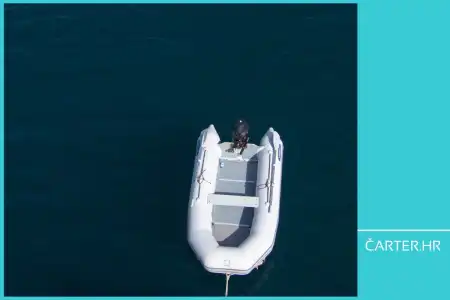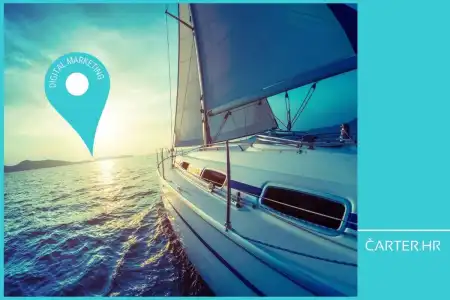
- 30.09.2024.
- News, Marketing, SEO, Web design
At first glance, combining all your services—yacht charters, boat repairs, apartment rentals—on one website seems efficient, right? After all, why not offer everything in one place? But... Trying to serve multiple markets at once can weaken your brand. Instead of appearing as an expert in several areas, you risk coming off as a master of none. Let’s break down why keeping your business focused and specialized is the smarter way to go.
When a business tries to succeed in multiple fields in hospitality, thinking all is related —such as offering yacht charters, boat repairs, and apartment rentals—it may seem like diversification.
However, in reality, it can result in a "putting all the eggs in one basket" model because all the services are being funneled through a single platform or brand.
Instead of focusing and excelling in one core area, the business is spread too thin, relying on a single website or operation to handle vastly different services.
The problem is that any failure or underperformance in one area can negatively impact the others.
Rather than reducing risk by diversifying across different platforms or business units, the business becomes vulnerable because all its varied services are tied to one main "basket"—the brand and website.
Attempting to succeed in too many fields under one roof actually increases the risk of failure, as the success of each area becomes interdependent on the overall brand’s reputation and the customer’s single experience with the company.
Nevertheless, many are tempted to combine multiple services into one website, which might seem efficient at first.
The core problem? Trying to be everything for everyone leaves your brand scattered, making it harder for people to trust you in any one area.
Mixing too many different services on one website, i.e. “all eggs in one basket”, holds your business back and weakens it by diluting focus and confusing both your future guests and search engines.
Dilution of brand identity
Brand identity thrives on clarity. Trying to sell yacht charters together with renting apartments or repairing boats can blur the focus of your business.
Instead of being the go-to for luxury/adventure experiences, you become the business that offers a little bit of everything—but stands out in none.
For example, a person looking for a yacht charter might hesitate if they see unrelated services, unsure of whether your expertise is really in yachts or if you're simply trying to do too much.
Instead of being known for excelling in one area, your brand risks appearing unfocused, making it harder to build trust and a strong reputation in any specific service.
A clear, focused brand is what builds trust and recognition.

User experience overload
Users visit websites to solve a specific problem or fulfil a particular need.
A website offering yacht charters, apartment rentals, and boat repairs all at once can overwhelm visitors with too many options.
When users are greeted with a cluttered menu filled with services that don’t align, it complicates everything.
If someone is only interested in chartering a yacht, they shouldn't have to sift through irrelevant pages to get there. Poor navigation or an overloaded interface leads to frustrated visitors - and higher bounce rates.
Loss of credibility in specialized services
Specialization builds/gives credibility.
If a company is known for its expertise in yacht charters but suddenly begins offering apartment rentals or boat repairs, it may cause doubt.
People expect a high level of knowledge and service in areas like yacht charters.
Mixing in unrelated services can send the message that you're spreading yourself thin, leading potential guests to question whether you’re truly a leader in your original field. Instead of building their trust, you might be undermining it.

Difficulty in targeting the right audience
Effective marketing relies on understanding who your audience is.
When you mix services different from boat repairs and yacht charters, you create a fragmented audience.
Yacht charter guests are likely sailors seeking adventure and “different” experiences, while those looking for boat repairs are after technical, cost-effective solutions.
Trying to market to these two groups simultaneously can dilute your messaging and make developing effective, targeted campaigns difficult. Marketing success comes from knowing your audience and speaking directly to their needs, something that’s much harder to do when you're serving too many types of people.

SEO and reduced rankings
Search engines reward websites that have a clear focus.
By combining different services, you muddy your content and keyword strategy.
For instance, optimizing for yacht charter keywords will be diluted if your website is also optimized for boat sales or apartment rentals.
When your site targets vastly different keywords (yacht charters, boat repairs, real estate rentals), it confuses the algorithms about what your site should rank for.
As a result, your site’s rankings in search engines may drop as search algorithms struggle to determine what your site is genuinely about.
Worse, if your competitors offer specialized websites, they may outrank you on the very services you're trying to promote.
Complex maintenance and content management
Managing a website with diverse services is not just about keeping the content up to date—it’s about ensuring each service is well-represented and easy to find.
When you mix unrelated services, each website section requires constant maintenance.
Product updates, service pages, SEO management, and customer support become more complicated, and errors or outdated information are more likely to slip through the cracks. The more complex your offering, the more difficult (and costly) it becomes to keep your website running smoothly.
Businesses that choose to specialize in one area have flourished as a result.
There are some successful examples of a yacht charter companies that have focused on yacht charters and luxury yacht management, offering high-end services without mixing unrelated offers.

How to be successful in your own niche?
Some do excel in combining - but yacht sales and yacht charter services only, maintaining brand clarity.
Websites that attempt to handle multiple, unrelated services (like vacation rentals and marine services) often end up with a diluted brand presence and struggle to establish expertise in any single domain.
Mixing different jobs on a single website might initially seem like a good idea.
However, in practice, it complicates the user experience, and weakens your credibility. Focusing on your core services and avoiding unrelated distractions allows you to present a clear, authoritative, and trustworthy business, ultimately leading to stronger guest relationships and better business outcomes.
Need help in achieving clarity? Contact us.
Categories of trends
- News
- Sale
- Marketing
- SEO
- Web design
- Social media
- Technology
- Regulations
- Management
- Education
- Finances
- User experience
Newsletter
Sign up for the newsletter and receive the latest trends and tips straight to your inbox



